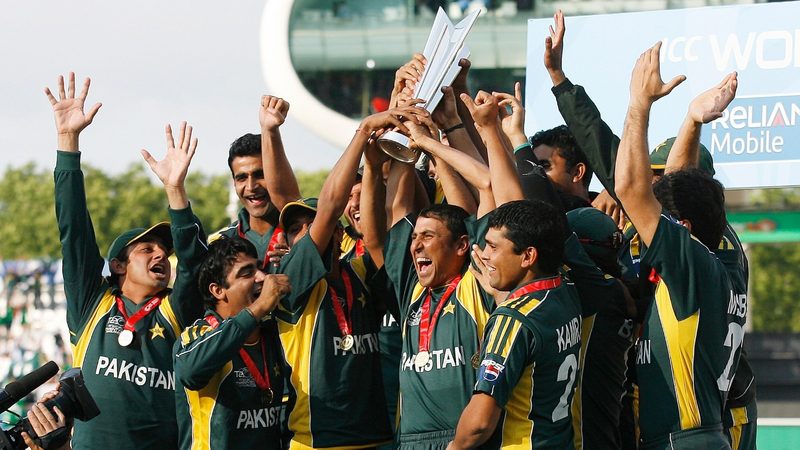
The Pakistan cricket team made its entry into international cricket in 1952, and since then, its erratic journey and unpredictable results has always kept it in the news.
The highs of the Pakistan national cricket team are mostly associated with their steady stream of talented players like Zaheer Abbas, Javed Miandad, Imran Khan, Wasim Akram, Shahid Afridi and current sensation Babar Azam.
And with respect to their lows, Pakistan have been plagued with disciplinary issues, ball-tampering, match-fixings and the mismanagement of players by the Pakistan Cricket Board over their long stay.
Here we showcase the moments that proved to be key highlights of the Pakistan cricket team’s journey across all formats of cricket over the decades.
First Test win in only second match
The Pakistan cricket team registered their maiden Test victory in only their second Test match. Incidentally, it was against their arch-rivals India in Lucknow.
India, led by Lala Amarnath, opted to bat first but were bowled out for just 106 thanks to Fazal Mahmood who recorded Pakistan’s first five-wicket haul in Test cricket. Riding on Nazar Mohammad’s unbeaten 125, Pakistan posted 331 on the scoreboard and once again had Mahmood torment India with a spell of 7/42 to script a win by an innings and 43 runs. While Pakistan lost the first and third Tests, the early win showed that they were no pushovers in international cricket.
First Test win on English soil
In 1954, just two years into international cricket, Pakistan entered the record books by becoming the first team to win a Test match in its inaugural tour of England.
In the first three matches of the four-match rain-marred Test series, England had won one while two were drawn but in the finale played at the Oval, Pakistan was set to script history.
On this day 1954. Fazal Mahmood's figures of 12 for 99 help Pakistan beat England by 24 runs at the Oval #Cricket pic.twitter.com/KGdaYiYIdl
— Saj Sadiq (@Saj_PakPassion) August 17, 2015
Electing to bat first, the low-scoring encounter saw the Men in Green muster only 130 but his back by bowling out the hosts for 133. Pakistan, however, couldn’t capitalise as they were dismissed for just 164 in the second innings. It proved to be enough. Fazal Mahmood, eventually named Man of the Match, followed up on his six-wicket haul from the first innings with yet another six wickets to hand the Pakistan cricket team a 24-run win and one of their greatest Test victories.
Wasim Raja’s drunken acts
The 1970s and 1980s was a troubling phase for the Pakistan cricket team, as they were locked in a bitter relationship with the cricket board and the government. And one of the victims was their talented all-rounder Wasim Raja.
Wasim, the older brother of former cricketer and commentator Rameez Raja, infamously unzipped his pants in front of the audience in the 1975 Karachi Test against the West Indies, with the local press reporting that he played the game in a drunken state.
Wasim Raja’s love for alcohol continued as he went into a drunken rage, smashing the mirrors for failing to make the cut in the 1976-77 Sydney Test against Australia, and he went on to accuse the team manager, Shujauddin, of favouritism.
Imran Khan anchors Pakistan’s first Test win Down Under
After a three-year drought in Test cricket, the Pakistan cricket team pulled off one of their greatest international victories in years thanks to Imran Khan’s six-wicket hauls in each innings of the 1976-77 Sydney Test.
Pakistan were 0-1 down in the three-match series, and new captain Mushtaq Mohammad’s usage of Imran Khan, who had just played 10 Tests by then, proved to be a masterstroke for the visitors. His first innings spell of 6/102 restricted the Aussies to 211, astonishing the hosts and the audience alike as the Kangaroos were outright favourites to win the Test.
Imran returned with a second six-wicket haul to bowl out Australia for 180, paving the way for Pakistan to need just 32 runs to pull off the greatest upset at that point of time.
Javed Miandad’s six that won a final vs India
While MS Dhoni’s 2011 World Cup-winning six is undeniably the greatest moment in modern cricket history, a certain Javed Miandad’s six in the final of the 1986 Austral - Asia Cup against India not only redefined the rivalry between the countries, but it turned the then 29-year-old into a national icon.
Imran Khan, the Pakistan captain, oversaw his team march past the formidable Australia and a helpless New Zealand, against whom they registered a 10-wicket win in the team’s lowest-scoring ODI encounter ever, to book a date with India.
#OnThisDay 1986. Javed Miandad with the six that broke a billion hearts #Cricket pic.twitter.com/Pf24AqRSYp
— Saj Sadiq (@Saj_PakPassion) April 18, 2020
Pakistan’ chase of 246 faltered along the way, and when they needed 90 runs to win in the last ten overs, Javed Miandad got the target down to 11 runs required from the last over. After losing two wickets and needing four off the last delivery, it was now or never for Miandad to deny Kapil Dev’s men a one-wicket victory. Instead, he hit a six. The 20,000-odd fans at Sharjah went into a frenzy and the incident has gone down as one of the most memorable moments in cricket history.
Unpredictables win 1992 Cricket World Cup
Pakistan cricket team’s journey at the 1992 Cricket World Cup was far from perfect, as their one win from their opening five fixtures left them on the cusp of a premature exit. But Imran Khan’s ‘Cornered Tigers’ quickly regained their footing with wins in their final three fixtures. In the semi-final, Pakistan pulled off a difficult run chase -- they needed eight runs an over in the final 14 overs -- against New Zealand to book a place in the final.
#OnThisDay in 1992, the Imran Khan-led Pakistan were crowned ICC Men's Cricket World Cup champions for the first time after beating England in the final in Melbourne by 22 runs.pic.twitter.com/ugiWjeYhyK
— Pakistan Cricket (@TheRealPCB) March 25, 2020
After Pakistan set England a target of 250 to chase in the final, Graham Gooch’s side was reduced to 69/4 and the English saw their chances of winning plummet after Wasim Akram’s twin strike in the 35th over. Eventually, Imran Khan, in the last moment of his ODI career, took the final wicket of Richard Illingworth to seal a fairytale victory. Pakistan’s world cup win is remembered as one of the landmark moments in the history of the sport.
Match-fixing stings Pakistan
The Pakistan cricket team of the 1990s was arguably one of the greatest in its history, but it also became synonymous for alleged involvement in match-fixing.
Rashid Latif, former captain and wicket-keeper, disclosed that Saleem Malik accepted bribes during Pakistan’s tour of South Africa and Zimbabwe in 1995. A judicial inquiry started probing the then Pakistan captain Ata-ur Rehman.
While the saga went on for 18 months, the players were finally banned for life and Wasim Akram, who failed to cooperate with the inquiry, was fined £3,300. Additionally, Waqar Younis, Inzamam-ul Haq, Akram Raza, and Saeed Anwar also received fines of £1200 each.
Ball-tamperings in 2006 and 2010
While they were still reeling from the match-fixing scandal, the Pakistan cricket team found itself amidst two ball-tampering scandals in 2006 and 2010, with the latter centred around Shahid Afridi.
In the 2006 Test at the Oval against England, umpires Darrell Hair and Billy Doctrove called out the Pakistanis for ball-tampering and awarded five penalty runs to the hosts. The fixture was later abandoned with captain Inzamam-ul-Haq, who was cleared of ball-tampering, being banned for four matches for bringing the game to disrepute.
In contrast to the 2006 incident, Shahid Afridi was caught on camera trying to bite the ball to alter its shape in their ODI game against Australia at Perth in 2010. The all-rounder pleaded guilty to the charge and the event significantly impacted his career that was constantly ridden with controversial decisions.
Bob Woolmer’s mysterious death
While the Pakistan cricket team’s 2007 Cricket World Cup defeat at the hands of debutants Ireland had already grabbed the biggest headlines, the death of then-head coach Bob Woolmer took the sporting world aback.

The Englishman, who was found unconscious in his hotel room, was rushed to the hospital but was declared dead on arrival. The mystery behind his death is still unresolved to this very day, with multiple theories based on the match-fixing and behind-the-scenes player tensions are woven.
T20 World Cup retribution
Pakistan, still healing from the violent attacks on the Sri Lankan team bus during the two nations’ Test series in 2009, entered that year’s T20 World Cup as underdogs but rode on the sheer brilliance of Shahid Afridi and Umar Gul to lift the title.

Incidentally, Pakistan locked horns against Sri Lanka in the 2009 T20 World Cup final that bore the burden of the Lahore tragedy earlier that year. But, the Men in Green showcased maturity and grit to capture the country’s second piece of ICC silverware since Imran Khan’s triumph in Australia.
Spot-fixing, a new scandal to hit Pakistan
Happy times didn’t last long for the Pakistan cricket team as three players, Mohammad Amir, Mohammed Asif and captain Salman Butt, were found guilty of spot-fixing in a Test match between Pakistan and England at Lord's in 2010. Consequently, they were given professional bans for a period of five, seven and 10 years respectively.
An undercover operation by News of the World brought forward the evidence that the three Pakistan cricket team players accepted money from bookmaker Mazhar Majeed to deliberately underperform at key moments in the Test match.
This event not only cast a shadow on the image of the Pakistan cricket team but also saw more than 80 of the nation’s previous matches coming under the scanner.
The unexpected 2017 Champions Trophy victory
Pakistan entered the 2017 ICC Champions Trophy as the lowest-ranked team in the competition but proved doubters wrong as they trounced arch-rivals India by 180 runs in the final.
After their opening loss to tournament favourites India, the Men in Green were completely written off from the competition. But they won their next two matches and once they stunned hosts England in the semi-final, Pakistan were expected to play out a thriller against India in the final at London.
Pakistan’s matches against India in ICC tournaments have been largely one-sided with the Men in Blue favourites.

But Virat Kohli’s decision to bowl first in the final backfired as Pakistan punished the likes of Jasprit Bumrah and Bhuvneshwar Kumar to plot a mammoth score of 339.
Sloppy starts and failure to build upon strong batting partnerships cost India the Champions Trophy title and thus, Pakistan once again pulled off an odds-defying triumph to consolidate their status as cricket’s most unpredictable team.
Feature image courtesy: AFP /




















